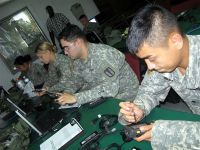WASHINGTON — Military medical personnel here are wrapping up training that ensures the 28,000 U.S. troops in South Korea are covered by the same casualty reporting system being used in Afghanistan, Iraq and 13 other forward-deployed locations around the world.
Eighth U.S. Army is completing a month of one-day classes on the Medical Communications for Combat Casualty Care -– or MC4 -– system that captures details about medical care provided to all forward-deployed U.S. forces, said Army Maj. Kevin Peck, chief information officer for the 65th Medical Brigade at Yongsan Garrison here.
Although the system isn’t new to the Korean peninsula, annual training classes introduce medical personnel who are new to the military or have never deployed to use the MC4 system. The classes also offer a chance for anyone who hasn’t used the system for awhile to brush up on its features.
MC4 started life in 2003 as an Army platform, Peck explained. But, he said, the Air Force and Navy both adopted it three years ago to replace their own separate electronic medical records systems for deployed airmen, sailors and Marines. The Navy still uses a separate reporting system aboard ships at sea.
The result is an increasingly universal medical records system, Peck said, noting a growing list highly deployable commands are adopting MC4 for use at their home stations.
Medics with the 2nd Infantry Division — serving just south of the demilitarized zone separating the two Koreas, the world’s most heavily armed border — recognize the value of using a single system to track patient care, whether at morning sick call or in combat.
“Each day, they’re logging into the same exact box that, if we go to war, they are going to pick up and walk out the door with and do patient care,” Peck said. “So there is no learning curve for these guys. They walk out the door and they keep doing the same thing they’ve been doing every day in the first place.”
MC4 represents a major step toward improving medical records accuracy and ultimately, patient care, said Peck, who oversaw the system’s use at numerous medical treatment facilities in Iraq before reporting to his current post.
“I think our providers are giving these kids the best care in the world. [They are doing] phenomenal work, saving lives and limbs,” he said. “However, if we stop there and don’t document it properly in MC4, then we haven’t finished the job.”
The system begins at the point of injury, where the tending medic keys-in details about the patient’s condition and rendered medical care into a rugged, handheld device. That information, which is then downloaded into a central data repository, will continue to follow the patient through successive treatment facilities in the theater and beyond, Peck explained.
The information will remain with the patients as they are evacuated to Landstuhl Regional Medical Center in Germany, to Walter Reed Army Medical Center in Washington, the National Naval Medical Center in Bethesda, Md., or another major military medical center.
The data continues with them throughout the rest of their military service, into retirement or as they transition to the Veterans Affairs Department’s system.
“The importance of this is that now, [for] everybody who is deployed downrange, all their medical record data and their documentation are put into the same system,” Peck said.
This helps medical personnel prepare to receive incoming casualties before they arrive and eliminates any confusion about medical procedures already performed or medications prescribed, Peck said.
“I know that if I send one of my soldiers downrange and he gets hurt, that he is not only going to receive the best medical care in the world on the spot, but that the care is going to continue with him as he evacuates out of the theater” and onto follow-on treatment in Germany and the United States, Peck said. “That care is going to follow him the whole way along.”
VA has access to the same records, which Peck said will clear up gray areas that can delay reviews for disability benefits and other services.
One of the big advantages of MC4 is that it requires no immediate Internet connectivity to operate. That makes it as useful during the first phases of contingency operations where there’s no Web access, as opposed to mature theaters such as Iraq and Afghanistan and in highly technologized South Korea.
“If I have a system that is solely Web-based and that’s the only way you can use it, it does me no good in a developing theater of war,” Peck said.
MC4 can run on standalone servers, capturing and storing data until it can be uploaded via the Internet.
“So I can set up a hospital and operate for six months without Internet connectivity,” Peck said. “All that care that we are providing on location is captured.”
Source:
U.S. Department of Defense
Office of the Assistant Secretary of Defense (Public Affairs)

 von
von 
